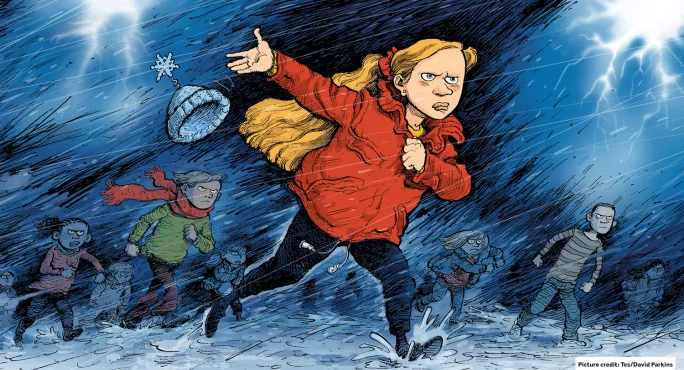- Home
- Our young people show courage, not fragility
Our young people show courage, not fragility

Generation snowflake is a myth. It is part of a long and dishonourable tradition that blames the young for the sins of their elders. Were you to believe the thesis of Claire Fox’s book, ‘I Find that Offensive!’ (see “The kids aren’t all right: the rise of the snowflake” in this week’s Tes), you would conclude that the young generation are indeed in a parlous state: indulged, cosseted, catastrophised by their elders and unable to deal with arguments that challenge their beliefs.
But so many of Claire’s arguments are based on partial evidence at best, and none at worst. She asserts that “happy leftie councils, hyper attuned to appeasing cultural grievance, are not figments of tabloid writers’ imaginations”; to illustrate, Claire cites the case of a self-harming pupil at a special school in 2013 who was given a disposable safety razor to cut him/her self while being supervised by a teacher (a case that certainly got tabloid headlines).
Shock! Horror! Who is to say no to this child? Well, actually, the teachers did. Very quickly. They complained to the local authority, which immediately investigated, stopped the practice and reported the school leader to the Teaching Council.
Far from being a case of adults supinely following the wish of the pupil, this showed adults exercising responsibility and professional judgement for a child who they recognised should not be able to do what they wanted, however much they wanted to.
Claire is quite clear when she identifies student voice and pupil-centred education as key culprits in the creation of Generation Snowflake. But I wonder just where did she acquire her entirely misplaced belief that English state schools are child-centred? Her examples are bizarre. She believes that primary school teachers routinely deploy a range of techniques in their classrooms, such as aromatherapy, yoga and chill-out music. I go into many state primary classrooms and I have never seen any such practices. So where’s the evidence, Claire?
Schools ‘aren’t child-centred’
The sad truth is English schools are not child-centred. They teach the national curriculum, which is devised by the government and, at present, is under control of schools minister Nick Gibb and his obsession with facts, facts, facts. Try telling the six- and seven-year-old pupils - who are required to recognise and name nouns, verbs, adjectives, adverbs, noun phrases, past and present tenses, the progressive form, statements, questions and commands - that the curriculum they are taught is child-centred.
Try telling this year’s GCSE students suffering from an unrelieved diet of 19th-century fiction as they take their English GCSE, or the new big, fat, hard maths syllabus, that they are at the centre of everything they are being taught, particularly as the arts and creative subjects so many of them love are squeezed out of the EBacc curriculum.
Next, Claire tells us, entirely inaccurately, that Ofsted has given official encouragement for students to assess the standard of lessons. This is not true. I even checked with Sean Harford, national education director of Ofsted, and he confirmed that the regulator has never encouraged students to do this.
And now we come to the heart of the matter. Having created a whole host of paper tigers, the core of Claire’s argument is that she, and people like her, are victims. Victims of political correctness. Censored by their inability to say just what they think.
For Claire, the battles of inequality are over. The progressive demands for equal treatment, fought by feminists, anti-racists and gay-rights activists no longer need to be fought and campaigners have, in her words, “degenerated into apolitical victim privileging, which uses victimhood as a currency for attention, resources and even power”. But these battles are not over. There is still systemic discrimination against women and girls. Over a three-year period, 5,500 alleged sexual offences (including 600 rapes) were reported to police as having occurred in schools. You must be no snowflake to be an advocate for equalities issues.
Claire asserts that words do not matter. They can’t really harm anyone. So abuse on Twitter is, according to her, “ultimately just words uttered by a bunch of pathetic saddos”. But words have a material effect upon the world. It is not supine emotional fragility that makes so many young people, who want to be engaged and involved in argument and debate on the issues of the day, retreat when they are faced with a barrage of vile abuse on social media.
The younger generation are not snowflakes. Young people work harder at school than we ever did. They achieve excellent results, only to find that there are few decent jobs to be had. They pay extortionate rents and many have no hope of owning a home. But they keep going. Youth unemployment is very low in the UK. This is surely testament to a generation who know the odds are stacked against them, but show enormous courage, persistence and tenacity. And good luck to them.
Dr Mary Bousted is general secretary of the ATL union. She tweets @MaryBoustedATL
Keep reading for just £1 per month
You've reached your limit of free articles this month. Subscribe for £1 per month for three months and get:
- Unlimited access to all Tes magazine content
- Exclusive subscriber-only stories
- Award-winning email newsletters



